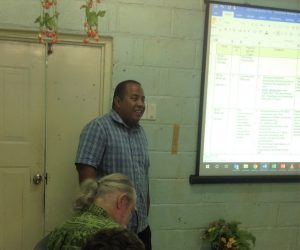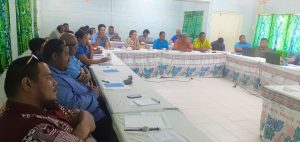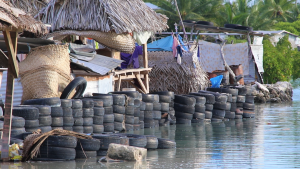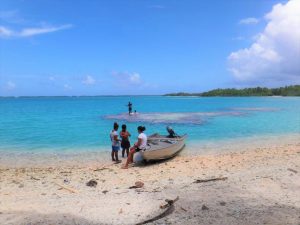Betio, Tarawa, Kiribati – Kiribati’s Office of the President, in conjunction with the Regional Pacific NDC Hub through technical assistance from the Global Green Growth Institute (GGGI) hosted its first national consultation workshop for the preparation of its NDC Implementation Roadmap, NDC investment plans and projects pipeline.

Mr. Roi Tabutoa, Deputy Secretary of the Office of the President opens the national consultation workshop.
The workshop was opened by the Deputy Secretary of the Office of the President Mr. Roi Tabutoa on 17th March 2020. One of the fundamental aims of this consultation was to get valuable feedback from key national stakeholders on the development of Kiribati’s NDC Implementation Roadmap, NDC investment plans and projects pipelines. These new national NDC documents focus on the transport (land, maritime and air transport) and energy efficiency sectors to implement Kiribati’s Nationally Determined Contribution (NDC) targets.

Key stakeholders from the public and private sector present at the national consultation.
As Kiribati works towards achieving its climate commitments under the Paris Agreement, a collaborated effort is vital from both the public and private sector to help Kiribati achieve its ambitious climate goals. Therefore, this national consultation brought together Government ministries, representatives of development organizations and private sector companies to get their inputs on the initial analysis for NDC implementation. Stakeholders have provided feedback on integrating energy efficiency and developing projects in the transport sector to achieve greenhouse gas mitigation at the local, national and global scale.

Impact of climate change in Kiribati. Villagers have built a makeshift sea wall to prevent inundation of sea water inland.
To increase its resilience to and mitigate the impacts of climate change, Kiribati is taking a leadership role as a Large Ocean State to implement NDC projects in country. In the energy efficiency sector, a key mitigation action proposed is a utility-led programme to manage demand and savings in South Tarawa (Kiribati’s capital). This action has an estimated greenhouse gas mitigation potential of up to 32,300 tCO2. Assessing, designing and constructing low energy/carbon building also presents an ambitious scenario of mitigating an estimated 2,900 tCO2.

Small boats are used for local transportation and village fishing trips.
Also, most of Kiribati’s inhabitants live on atolls. Given those atolls are flat, transitioning to bicycles and e-bikes is feasible. This would help decrease CO2 emissions and also help fight several non-communicable diseases (NCDs) which are significant issues in Kiribati. The people of Kiribati also rely greatly on maritime transport for fishing and local village transport with more than 4,000 small boats in the country. Hence, gradually transitioning from 2-stroke to 4-stroke to electric outboard motors is a viable investment in decarbonizing the maritime transport sector. Along with this, revitalization of traditional sailing culture in Kiribati will also help decrease CO2 emissions.
Following this national consultation, the Pacific NDC Hub will consolidate through GGGI all inputs and proceed to developing an NDC Implementation Roadmap and associated NDC investment plans and projects pipeline for Kiribati. Once this is completed, another national workshop will be convened for validation of these NDC implementation documents. Upon validation by national stakeholders, the NDC implementation documents will be with the Kiribati Government cabinet for endorsement. Finally, using these documents as a guiding path, the Regional Pacific NDC Hub with technical support from GGGI will facilitate the NDC implementation process for Kiribati.
The Regional Pacific NDC Hub is implemented through a partnership between the Deutsche Gesellschaft für Internationale Zusammenarbeit (GIZ), the Global Green Growth Institute (GGGI), the Pacific Community (SPC) and the Secretariat of the Pacific Regional Environment Programme (SPREP) in contribution to the NDC Partnership, with financial support from Germany, United Kingdom, Australian and New Zealand Governments.